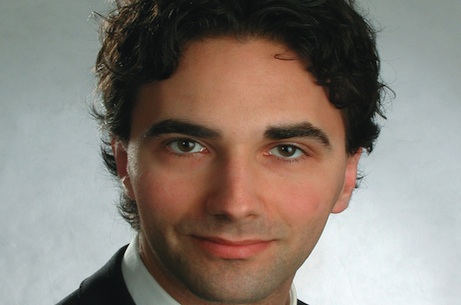
Jonathan Miller's obsession with cars has taken him to a PhD at Cambridge on truck brake systems and a job working on BMW's new electric cars.
Jonathan Miller [2006] has been obsessed with cars since he was a baby and had a toy car in his crib.
Growing up, most of his toys were car related; he had car wallpaper and was always watching car-related films and videos. He dreamed of being a stunt car driver and at 14 owned his first car which he took apart but couldn’t put back to together because he didn’t know enough about mechanics.
A couple of decades later, after doing a PhD in Engineering at Cambridge, he is working as a project manager and development engineer for BMW in Germany on the latest in car manufacturing – production electric vehicles.
Born in Alberta, Canada to a dentist father and a psychologist mother, Jonathan says there have been several formative experiences in his life which paved his way to where he is now. The first was during his undergraduate degree in Mechanical Engineering at the University of Calgary when he did an internship in Japan with a German automotive parts supplier, his first experience in the car industry. He had never lived away from home, he spoke no Japanese and his degree focused on the oil and gas industry in Calgary.
Within a year of working on building intranet websites [Jonathan was speaking conversationally fluent Japanese. That proven ability to learn a language fast was to help him win his BMW job in Germany years later.
Jonathan says the experience in Japan helped him grow up and opened his mind to a greater world of possibilities than the oil and gas sector in Calgary. He decided to apply for a two-year masters at McGill University in Montreal where he worked on design aeronautics, including surveillance balloons. He also did a range of extracurricular activities, including creating an ultimate frisbee league, and joined groups including Engineering without borders.
PhD
He decided to apply abroad to do his PhD after realising he might be able to study automobile engineering outside Canada. He applied to do a PhD in vehicle dynamics at Cambridge and was accepted, but he had just missed the deadline for scholarships. He had won a scholarship for Canada, but decided to take a risk, decline the scholarship, reapply to Cambridge, and apply for the Gates Cambridge Scholarship.
He was accepted for an internship in the UK, but was turned down for a visa due to an administrative error, and he had to move back to Calgary and take a job in the oil and gas industry for a year. His gamble paid off, though, and he was offered a Gates Cambridge Scholarship.
For his PhD Jonathan focused on creating a new braking system for heavy vehicles. “The braking systems on heavy vehicles are archaic. By modifying the controls we aimed to help heavy vehicles brake as efficiently and safely as cars do and to make them more fuel efficient and ecological,” says Jonathan. He worked in a consortium of 15 industrial companies, including Volvo and Goodyear.
His research included practical tests in which he got to drive trucks and slam on the brakes to test them – the kind of stunt racing he had dreamt about as a child. “I felt like I was in Disneyland,” he says.
Industry
After finishing his PhD he was keen to work in the automotive industry and to “make a difference”. However, it was the beginning of the recession and the automotive industry had been badly hit. He spent much of his fourth year applying for jobs and was offered one as a development engineer for vehicle safety systems with UK-based Haldex, the main sponsoring company for his PhD. He was able to progress his PhD work, but after two years his UK visa ran out and, even though the company wanted to keep him on, they were not able to. “After six years in the UK, doing a PhD which generated five academic papers and despite being a person who wanted to give something back, I had to leave,” says Jonathan. “It was a ridiculous situation and one which I know several other PhD students have been in.”
His girlfriend, fellow Gates Cambridge Scholar Eva-Maria Hempe, was offered a job in Munich and Jonathan applied to BMW. Three days later he was called up and soon after offered a job despite not speaking German. Due to his experience in learning Japanese, Jonathan was able to persuade BMW that he could learn German. For the last year he has been doing three hours of German six nights a week, and after six months began working completely in German.
As well as building electric cars which are targeted towards urban mobility, BMW BMW has created a concept hybrid-electric supercar, which has attracted a huge amount of interest. “It’s very important that the electric car can drive as well or better than a regular car,” Jonathan says.
A Gates Cambridge Scholars Council technical officer in his time at Cambridge, Jonathan says he has been very much influenced by the Gates ethos of making a difference and feels happy that the BMW projects will do that. He says: “BMW is pressing ahead with electric cars when some other companies have put them on hold. It’s exciting to be working for a company that is committed to pushing the technological boundaries in an area that benefits the world.”












